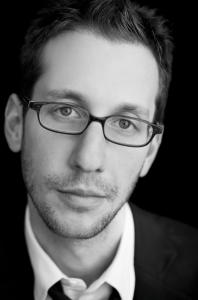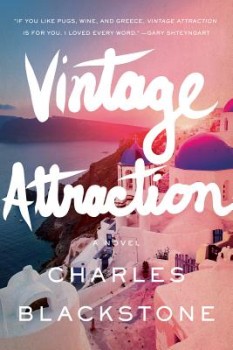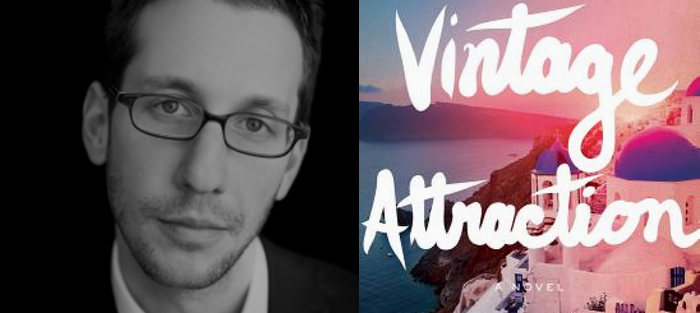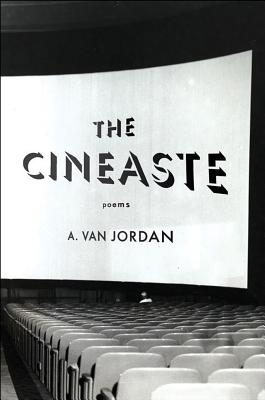 It was October 2005, and professionally and personally, I was rudderless. Where had I gone wrong? In the preceding two years, I’d finished serving my grad school sentence and been released from Boulder. Back in Chicago, the city in which I’d grown up, I’d taken a one-bedroom apartment in a baseball-sodden neighborhood with scant street parking. I was halfheartedly teaching some community college comp and developmental reading courses (my sole qualification for getting the unclaimed developmental reading assignment: my willingness to take the teacher’s edition and my vow to learn something in the days before I’d have to face the students). I’d published The Week You Weren’t Here (Low Fidelity Press), the novel I’d begun in my last semester of college. I was nearing the end of the weekends-and-semester-breaks book tour I’d assembled in support of it. Despite the publicity distraction, I was aware that I wasn’t writing anything new (besides e-mails to bookstores and journalists), and that fact chafed. But for an autobiographical fictioneer with a penchant for love stories, there really didn’t seem to be anything particularly significant going on in my life worth writing about.
It was October 2005, and professionally and personally, I was rudderless. Where had I gone wrong? In the preceding two years, I’d finished serving my grad school sentence and been released from Boulder. Back in Chicago, the city in which I’d grown up, I’d taken a one-bedroom apartment in a baseball-sodden neighborhood with scant street parking. I was halfheartedly teaching some community college comp and developmental reading courses (my sole qualification for getting the unclaimed developmental reading assignment: my willingness to take the teacher’s edition and my vow to learn something in the days before I’d have to face the students). I’d published The Week You Weren’t Here (Low Fidelity Press), the novel I’d begun in my last semester of college. I was nearing the end of the weekends-and-semester-breaks book tour I’d assembled in support of it. Despite the publicity distraction, I was aware that I wasn’t writing anything new (besides e-mails to bookstores and journalists), and that fact chafed. But for an autobiographical fictioneer with a penchant for love stories, there really didn’t seem to be anything particularly significant going on in my life worth writing about.
I was alone. I’d been romantically bereft since an all-too-brief fling with a soft-spoken, dark-haired, icy-eyed, skeptical Southerner I met online in the months before I turned in my (recycled) thesis. In spite of this, or because of it, I’d taken up online dating again. As had been pretty much the case ever since I began it before I moved to Colorado, my current campaign was met with little durable success. Their faces were interchangeable. They all sounded alike. Sometimes I got them back to my place to make out, and sometimes they’d spend the night. This was an infrequent outcome. And though there might have been a morning-after brunch here and there, there were rarely second evenings. I could have continued on in this manner, but I’d already covered the lows and lowers of Nerve.com and JDate exhaustively (and exhaustingly) in my first novel. There was nothing left to mine.
Except for the future.
One Saturday afternoon, I tried something I’d never done before: I turned off the computer and turned on the television. This was the moment that everything changed. Shortly, I’d stumble, glass first, into the world of wine and love—and a new novel to write.
Though the show in which “three ordinary Chicagoans get together to recommend and review their favorite restaurants,” as the scripted preamble goes at each episode’s opening, had been on the local public television air for years, I’d never watched Check, Please! before coming across a rerun that day. I almost flipped past it. But something about how the guests bantered back and forth about this steakhouse and that deli snagged me. Still, I was only half paying attention. The host of the show, Master Sommelier Alpana Singh, was distracting me. I couldn’t take my eyes off her. Even when she wasn’t on camera, I could hear her voice apart from the others. She was so charming, so funny, so magnetic, so real. It was almost as though we already knew each other. I had to meet this person.
Monday morning, I applied to be on Check, Please! I didn’t really want to be a guest. Sure, I enjoyed restaurants in the city and had some opinions about dining, but my interest in the program was just a ploy to meet Alpana Singh. I was convinced she would enjoy my performance on the set so much, find me so charming and funny, that the celebrity sommelier would want to have a glass of wine with me afterward. (Never mind that pretty much the only thing I knew about wine was that it was made from grapes.) The application, as far as I could see, was the only thing standing between us, so I got to work. I described myself as a local novelist. The restaurant I recommended was one that had meant a lot to me growing up in Chicago in the mid-90s, a little dingy joint in Wrigleyville, blocks from where I now resided, called The Hamburger King. Here there were no Whoppers. This joint served steam grill staples alongside teriyaki bowls. I only ate breakfast there, regardless of when I went in. Two eggs, two pieces of toast, two bacon strips, and—the tastiest part—sticky rice with Japanese gravy, and a cup of coffee, all for less than $5. What wasn’t to love?
I’d been told on occasion that my words on the page (prose) and screen (Nerve.com emails to potential dates) were compelling—dare I say persuasive?—and I was sure I’d get chosen immediately and be on the show by the end of the week. But nothing happened. Nobody wrote. Nobody called. (And, all these years later, The Hamburger King still has not been featured.)
As far as my path to love went, it was on to plan B. Friday afternoon, I decided to email the host (who I’d been Googling compulsively while waiting for the call that never came) directly. The subject line was “An impassioned plea (I think) for attention.”
So, I’m sort of just guessing that this is your address, it began, and also that even if this were your address, that you check this account, given the fact that there have probably been at least 35,214 people who at one point tried reaching you this way. I’ve been catching up on reruns, and let’s face it, in the last season or two, most of the guests have been kind of dogmatic and a little overdramatic. Bring me in to shake things up a bit. Please. I want to help the sommelier with the, er, mostellier make good TV. Really, I’m just interested in meeting you and figured this whole trying-to-get-on-the-show thing (and, with any luck, this e-mail) might make for a good entree, no pun intended. I signed off, Yours in brioche, Charles Blackstone, Novelist, Teacher, Chicagoan, Swashbuckler, Eater, Drinker, Butcher, Baker, Candlestick Maker. It took her only eight minutes to answer. My goodness! Your email really made me laugh, and that’s always a good thing. Plus if you really are a butcher, that’s even better. I don’t think we have ever had a butcher on before. This is definitely one passionate plea to get on the show.
It wasn’t passionate enough, however. She went on to tell me the casting decisions were that of the producer’s, there was a long queue of applicants, the production already wrapped for the season, my chances of getting on next year were scarce, but she appreciated the laugh, and thanked me for trying.
So, that was that, some might have thought. Not me. I’m a novelist, after all, so tend to live my life like a character in a novel. A character can’t just give up, just when the story is getting going! I got us to talking, or typing, and we kept emailing each other for the rest of the afternoon. I made jokes about Kiddush wine from my Bar Mitzvah. I told her about the novel that I’d just published, which she wanted to read. I asked what she was doing that night so that I could give her a copy of the book (another shameless ploy, I know, but you have to work what works, right?). Then, suddenly, the rapid-fire messages came to an unanswered halt. I’d blown it. But two hours and fifty-nine minutes later, came the reply. She had a prior commitment that night, it turned out: an event at the Hard Rock Hotel she was to emcee. Still, she invited me to meet her at the bar there for a drink beforehand.
It started out as any nerve-wracking and alcohol-sodden blind date, an evening to be consumed and quickly forgotten about like the kind of glass of Pinot Grigio that comes from a complimentary drink ticket. She had to announce the names of the regional Emmy Award winners. She had this buffoon of a self-styled business partner in tow. I was dressed shabbily (there was no time to change!) and had a messenger bag full of student essays and assignments I had no intention of ever reading slung across my back and had been drinking and continued to drink too much vodka. Yet for some reason, at some point, the night took a turn, a swirl, for the indelible: we fell in love. Or, as we like to say, I fell in love, she couldn’t get rid of me, and would eventually find the only choice was to marry me. (“Or get a restraining order,” she’s wont to add.)
From there, our life became a busy one, and a boozy one. We whizzed from one restaurant and cocktail reception and wine-and-food festival to the next. The enological life, I learned, was intoxicating. As intoxicating as love. And there had to be a book in the confluence of this somewhere.
 Being observant and conscious of the world around me has always been an occupational hazard. If you’re drinking wine at bars and in restaurants and in your living room with one of only two hundred people in the world ever to receive the nearly statistically impossible distinction of Master Sommelier (not to mention one recognized by so many), it’s going to be pretty hard not to gather data about wine and about life. And it’s going to be pretty hard, if you’re a fiction writer, to not want to take that data and recast it, recapture it, in prose in order to understand it and to learn something, in order that someone else may be able to read it and understand the world a little better and learn something about themselves in the process. Some unconscious part of me probably began taking notes for a novel set in this world at the moment I heard her tell an audience—which, as unlikely as it was, included me—that true wine appreciation wasn’t about points and scores and three-digit price tags, but rather it was about learning how to enjoy what was in your glass.
Being observant and conscious of the world around me has always been an occupational hazard. If you’re drinking wine at bars and in restaurants and in your living room with one of only two hundred people in the world ever to receive the nearly statistically impossible distinction of Master Sommelier (not to mention one recognized by so many), it’s going to be pretty hard not to gather data about wine and about life. And it’s going to be pretty hard, if you’re a fiction writer, to not want to take that data and recast it, recapture it, in prose in order to understand it and to learn something, in order that someone else may be able to read it and understand the world a little better and learn something about themselves in the process. Some unconscious part of me probably began taking notes for a novel set in this world at the moment I heard her tell an audience—which, as unlikely as it was, included me—that true wine appreciation wasn’t about points and scores and three-digit price tags, but rather it was about learning how to enjoy what was in your glass.
It was inevitable, given the background of the diner who I’d pitched to a TV show in the application that got lost in the virtual shuffle, that this unique vantage would inform Vintage Attraction (Pegasus/Norton), the second novel I’d someday publish. Autobiographical fiction is an art form that allowed me to hand off my experiences to characters for them to live, as I had, and as I hadn’t. I knew where the story began, but I didn’t know where it would go on the page.
I’d spend the next eight years of my life trying to find out.






